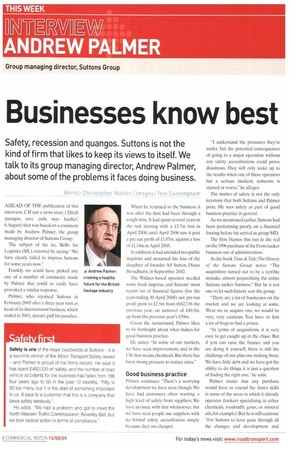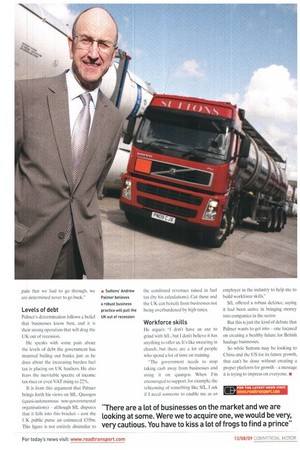usinesses know best
Page 18

Page 19

If you've noticed an error in this article please click here to report it so we can fix it.
Safety, recession and quangos. Suttons is not the kind of firm that likes to keep its views to itself. We talk to its group managing director, Andrew Palmer, about some of the problems it faces doing business.
Words: Christopher Walton it Images: lorn Cunningham
AHEAD OF THE publication of this interview, CM ran a news story ('Ditch quangos, save cash, says haulier 6 August) that was based on a comment made by Andrew Palmer, the group managing director of Suttons Group.
The subject of his ire, Skills for Logistics (SfL), retorted by saying: "We have clearly failed to impress Suttons for some years now."
Frankly, we could have picked any one of a number of comments made by Palmer that could so easily have provoked a similar response.
Palmer, who rejoined Suttons in February 2005 after a three-year stint as head of its international business, which ended in 2001, doesn't pull his punches When he returned to the business, it was after the firm had been through a rough time. It had spent several years in the red, starting with a £3.7m loss in April 2000, until April 2006 saw it post a pre-tax profit of £1.07m, against a loss off1.14m in April 2005.
In addition, it had attended two public inquiries and mourned the loss of the daughter of founder Alf Sutton, Diane Broadhurst, in September 2002.
The Widnes-based operator needed some fresh impetus, and Suttons' most recent set of financial figures (for the year-ending 30 April 2008) saw pre-tax profit grow to £2.5m from £682,136 the previous year, on turnover of £40.5m. up from the previous year's 139m.
Given the turnaround, Palmer likes to be forthright about what makes for good business practice.
He states: "In some of our markets, we have seen improvement; and in the UK that means chemicals. But there has been strong pressure to reduce rates"
Good business practice
Palmer continues: "There's a worrying development we have seen, though. We have had customers often wanting a high level of safety from suppliers. We have no issue with that whatsoever, but we have seen people use suppliers with no formal safety accreditation simply because they are cheaper. "I understand the pressures they're under, but the potential consequences of going to a major operation without any safety ac.creditations could prove disastrous They will only wake up to the results when one of these operators has a serious incident, someone is injured or worse," he alleges.
The matter of safety is not the only keystone that both Suttons and Palmer prize. He sees safety as part of good business practice in general.
As we mentioned earlier, Suttons had been performing poorly on a financial footing before his arrival as group MD.
The firm blames this run in the red on the 1996 purchase of the Ferns tanker business out of administration.
As the book Time & Tide. The History of the Suttons Group notes: "The acquisition turned out to be a terrible mistake, almost jeopardising the entire Suttons tanker business." But he is not one to let such history scar the group.
"There are a lot of businesses on the market and we are looking at some. Were we to acquire one, we would be very, very cautious. You have to kiss a lot of frogs to find a prince.
"In terms of acquisitions, it is very easy to get caught up in the chase. But if you can raise the finance and you are doing it yourself, there is still the challenge of one plus one making three. We have little debt and we have got the ability to do things. it is just a question of finding the right one,he adds.
Palmer insists that any purchase would have to extend the firm's skills in some of the areas in which it already operates (tankers specialising in either chemicals, foodstuffs, gases, or mineral oils, for example). But he is still cautious: "For Suttons to have gone through all the changes and development and pain that we had to go through, we are determined never to go hack."
Levels of debt
Palmer's determination follows a belief that businesses know best, and it is their strong operation that will drag the UK out of recession.
He speaks with some pain about the levels of debt the government has incurred bailing out banks, just as he does about the increasing burden fuel tax is placing on UK hauliers He also fears the inevitable spectre of income tax rises or even VAT rising to 22%.
It is from this argument that Palmer brings forth his views on SfL. Quangos (quasi-autonomous non-governmental organisations) — although SIT., disputes that it falls into this bracket — cost the UK public purse an estimated £35bn. This figure is not entirely dissimilar to the combined revenues raised in fuel tax (by his calculations). Cut these and the UK can benefit from businesses not being overburdened by high taxes.
Workforce skills He argues: -I don't have an axe to grind with SfL, but I don't believe it has anything to offer us. It's like swearing in church, but there are a lot of people who spend a lot of time on training.
"The government needs to stop taking cash away from businesses and using it on quangos When I'm encouraged to support, for example, the relicensing of something like SfL. I ask if I need someone to enable me as an employer in the industry to help me to build workforce skills."
SfL offered a robust defence, saying it had been active in bringing money into companies in the sector.
But this is just the kind of debate that Palmer wants to get into — one focused on creating a healthy future for British haulage businesses.
So while Suttons may be looking to China and the US for its future growth, that can't be done without creating a proper platform for growth — a message it is trying to impress on everyone. •












































































































































